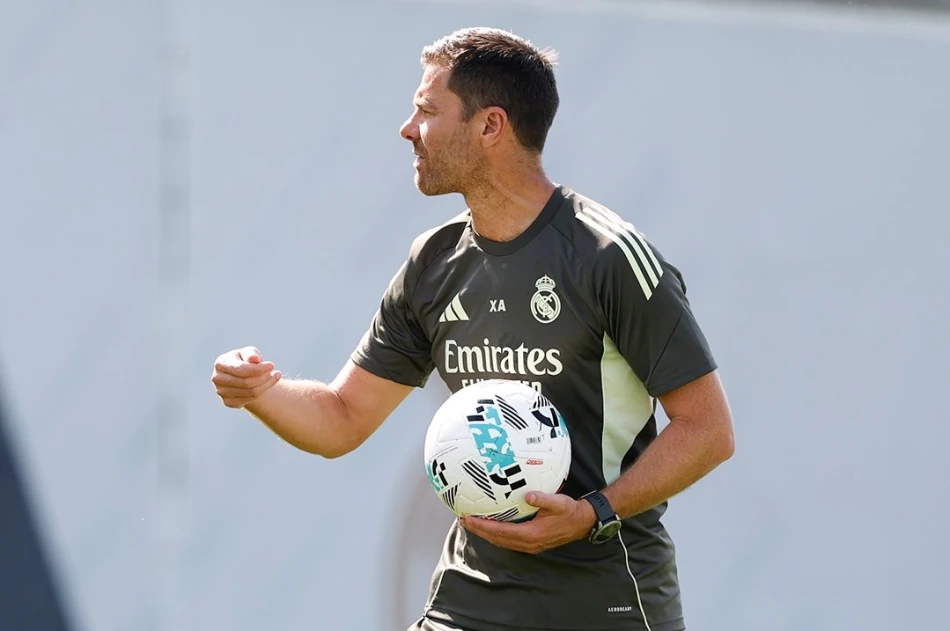
Real Alonso Seeks Redemption after Ancelotti's Disappointing Finish
Real Madrid's Fresh Start: Can Xabi Alonso Fix What Ancelotti Couldn't?
Real Madrid enters the new Spanish La Liga season with a dramatically different energy under new manager Xabi Alonso, who faces the challenging task of rebuilding a squad that ended last season empty-handed despite Kylian Mbappé's 43 goals. The former midfielder's tactical flexibility and demand for collective defensive responsibility could be the antidote to the systemic issues that plagued Carlo Ancelotti's final campaign.
The Ancelotti Era's Bitter End
Last season exposed fundamental flaws in Madrid's approach that even world-class talent couldn't mask. Despite Mbappé's prolific scoring after his high-profile move from Paris Saint-Germain, Real Madrid surrendered both La Liga and the Champions League titles. Barcelona's domestic treble served as a stark reminder of how far the royal club had fallen from its traditional standards.
The 4-0 semifinal defeat to PSG in this summer's Club World Cup in the United States crystallized these problems. For Alonso, watching his new team dismantled by Mbappé's former club provided a harsh but valuable reality check about the work ahead.
Tactical Revolution Under Alonso
Defensive Discipline for Star Players
Alonso's most significant departure from his predecessor lies in his non-negotiable demand for collective defensive responsibility. Where Ancelotti often accommodated his attacking stars' reluctance to track back, Alonso has made it clear that everyone must contribute defensively.
"We need and want everyone to defend," Alonso stated during the Club World Cup. "All 11 players on the pitch must participate defensively. Vinicius, Jude [Bellingham], Fede [Valverde], Kylian... the defenders must also move forward."
This philosophy directly addresses one of Madrid's core weaknesses: the disconnect between their devastating attack and increasingly porous defense. Modern football's most successful teams—from Pep Guardiola's Manchester City to Jürgen Klopp's Liverpool—have thrived on this principle of collective pressing and defensive work rate.
Tactical Flexibility
Unlike Ancelotti's rigid preference for a four-man defense, Alonso has demonstrated willingness to switch between back-three and back-four formations mid-game. This adaptability could prove crucial in European competition, where tactical adjustments often determine knockout outcomes.
Squad Transformation: €200 Million Investment
Key Arrivals
Madrid's €170 million summer spending reflects their determination to address systemic issues. Trent Alexander-Arnold's arrival from Liverpool adds world-class attacking threat from full-back—a dimension that could unlock new tactical possibilities. The England international's ability to create from deep positions mirrors the evolution of modern full-backs like Bayern Munich's Alphonso Davies or Manchester City's João Cancelo.
Dean Huijsen's addition aims to shore up defensive vulnerabilities, while young talents Álvaro Carreras and Franco Mastantuono represent long-term investments in the club's future.
Notable Departures and Absences
For the first time in over a decade, Madrid begins a season without Luka Modrić in their regular lineup. The Croatian maestro's reduced role creates both opportunity and risk—while it opens space for emerging talents like 20-year-old Turkish playmaker Arda Güler, it also removes a player whose game intelligence and passing range remain unmatched.
Jude Bellingham's absence until mid-October due to shoulder surgery further emphasizes the importance of Güler's development. The young Turk's ability to control game tempo could determine whether Madrid maintains their traditional possession-based identity.
Market and Competitive Implications
Madrid's aggressive spending and coaching change signal their recognition that the modern game has evolved beyond individual brilliance. Barcelona's recent success under various managers demonstrates that tactical cohesion trumps star power—a lesson Madrid appears to have internalized.
From an investor perspective, Madrid's transformation represents a calculated risk. The club's commercial value depends heavily on on-field success, particularly in the Champions League. Alonso's appointment, while promising, lacks the proven track record of alternatives like Antonio Conte or Mauricio Pochettino.
The Mbappé-Vinicius Puzzle
Alonso's greatest challenge remains integrating Mbappé and Vinicius Junior without sacrificing defensive stability. Both players prefer operating from the left wing, and their reluctance to defend has historically created tactical imbalances.
Successful integration could mirror how Liverpool managed Mohamed Salah and Sadio Mané's partnership, or how Manchester City has utilized multiple attacking threats across their front line. The key lies in establishing clear defensive triggers and ensuring both stars understand their off-ball responsibilities.
Early Season Expectations
Alonso's emphasis on "ambition" and "energy" suggests a more intensive, pressing-based approach than Ancelotti's often conservative tactics. This shift aligns with broader trends in elite football, where teams like Arsenal and Newcastle have found success through high-intensity, coordinated pressing.
The early season will test whether Madrid's aging core can adapt to increased physical demands, and whether new signings can integrate quickly enough to challenge Barcelona's domestic dominance and compete with Europe's elite.
Alonso's revolution represents more than tactical adjustment—it's a philosophical shift toward modern football's collective approach. Success will depend on whether Madrid's superstars can embrace roles that prioritize team success over individual glory.
Most Viewed News

 Sara Khaled
Sara Khaled






